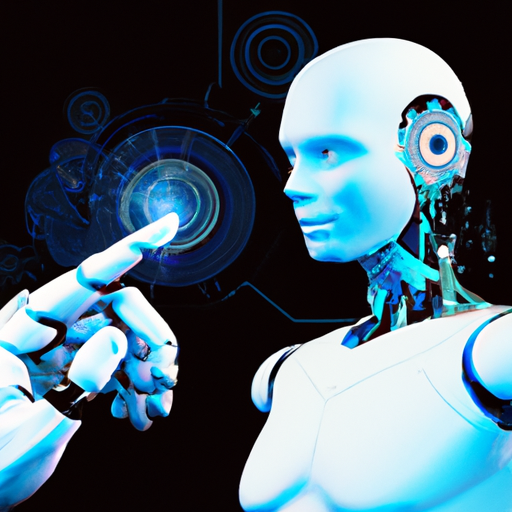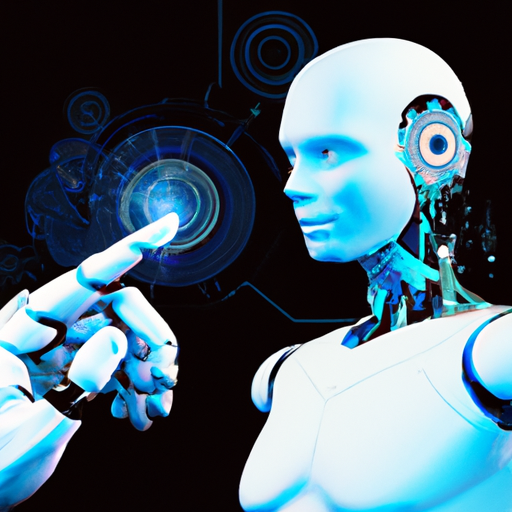Artificial Intelligence (AI) is a concept that may sound complex, but in reality, it’s quite fascinating. Essentially, AI refers to the ability of machines or computer systems to exhibit human-like intelligence, where they can understand, learn, and solve problems independently. From self-driving cars to virtual personal assistants, AI is transforming the world we live in, revolutionizing industries, and enhancing the way we interact with technology. In this article, we will explore the fundamentals of AI, its applications in various fields, and the promising future it holds. So, fasten your seatbelt and get ready for an exciting journey into the world of Artificial Intelligence!
Definition of Artificial Intelligence (AI)
Introduction to AI
Artificial Intelligence (AI) refers to the simulation of human intelligence in machines that are programmed to think and learn like humans. It involves the use of algorithms and complex mathematical models to mimic cognitive functions, such as problem-solving, learning, and decision-making. AI systems are designed to analyze vast amounts of data, recognize patterns, and make predictions or take actions based on their findings.
Explanation of AI
At its core, AI is about creating intelligent machines that can perform tasks that typically require human intelligence. This includes activities like speech recognition, problem-solving, language translation, and visual perception. Artificial intelligence can be categorized into different types based on its capabilities, ranging from narrow AI, which is focused on specific tasks, to general AI, which possesses a broader set of cognitive abilities similar to human intelligence. Superintelligent AI, on the other hand, refers to AI that surpasses human intelligence in all areas.
History of Artificial Intelligence
Emergence of AI
The concept of artificial intelligence emerged in the 1950s and was driven by the desire to create machines that could exhibit intelligent behavior. The foundations of AI were laid through the work of pioneers such as Alan Turing, who proposed the concept of a Turing machine capable of imitating any other machine, and John McCarthy, who coined the term “artificial intelligence” and organized the Dartmouth Conference in 1956, which is considered the birth of AI as a field of study.
Milestones in AI Development
Over the years, there have been several significant milestones in the development of AI. In 1957, the first AI program, the Logic Theorist, was created to prove mathematical theorems. In the 1970s, expert systems gained prominence, allowing computers to reason and make decisions based on stored knowledge. The 1990s saw advancements in machine learning algorithms, leading to the development of practical applications such as spam filters and handwriting recognition. More recently, deep learning techniques have revolutionized AI, enabling breakthroughs in areas such as image recognition and natural language processing.

Types of Artificial Intelligence
Narrow AI
Narrow AI, also known as weak AI, refers to AI systems that are designed to perform specific tasks or functions. These systems excel in a narrow domain and are built to solve well-defined problems. Examples of narrow AI include voice assistants like Amazon’s Alexa, which can understand and respond to voice commands, and self-driving car systems that can navigate their environment.
General AI
General AI, also referred to as strong AI, represents AI systems that possess the ability to understand, learn, and apply knowledge across a wide range of tasks, similar to human intelligence. Unlike narrow AI, general AI seeks to excel in various domains, rather than being limited to a particular task. Achieving general AI remains a significant challenge, as it requires the development of highly adaptable and flexible systems that can transfer knowledge and skills across different contexts.
Superintelligent AI
Superintelligent AI refers to an AI system that surpasses human intelligence in virtually every aspect. It represents the potential future development of AI technologies that could significantly outperform human capabilities in problem-solving, decision-making, and creativity. While superintelligent AI remains speculative and hypothetical at present, it is a topic of considerable discussion and debate among researchers and ethicists.
Applications of Artificial Intelligence
Automation and Robotics
AI has revolutionized automation and robotics, enabling the development of machines and systems that can perform complex tasks with precision and efficiency. Robots equipped with AI algorithms can carry out manufacturing processes, perform surgery, or operate in hazardous environments, reducing the risk to human workers.
Natural Language Processing
Natural Language Processing (NLP) focuses on the interaction between computers and human language. AI-powered NLP systems can understand, interpret, and respond to human language in an intelligent manner. This technology has applications in virtual assistants, chatbots, language translation services, and text analysis tools.
Expert Systems
Expert systems are AI software programs that contain knowledge and rules gathered from human experts in a specific domain. By leveraging this knowledge, expert systems can provide intelligent recommendations and solutions to complex problems. They are widely used in areas such as medicine, finance, and engineering.
Image and Speech Recognition
AI algorithms have greatly advanced image and speech recognition capabilities. Image recognition allows computers to analyze and understand images, enabling applications such as facial recognition, object detection, and self-driving car vision. Speech recognition technologies, on the other hand, enable computers to convert spoken words into written text, powering voice assistants and transcription services.
Recommendation Systems
Recommendation systems are AI algorithms used to provide personalized recommendations to users based on their preferences, behavior, and historical data. These systems are commonly seen in e-commerce platforms, streaming services, and social media platforms, where they suggest products, movies, or content that users are likely to be interested in.
Autonomous Vehicles
AI plays a crucial role in the development of autonomous vehicles. Through a combination of sensors, computer vision, and advanced algorithms, self-driving cars can perceive their surroundings, interpret traffic signs, and make decisions about acceleration, braking, and lane changes. AI helps improve the safety and efficiency of transportation systems, potentially reducing accidents and traffic congestion.

Ethical Considerations in AI
Bias and Fairness
One of the key ethical concerns in AI is the potential for bias and unfairness in the algorithms used. AI systems are trained on large datasets that may contain inherent biases, leading to discriminatory outcomes. It is essential to address this issue by ensuring that AI systems are trained on diverse and representative data and by implementing measures to mitigate bias and ensure fairness in their decision-making processes.
Privacy and Security
The use of AI involves processing and analyzing large amounts of personal data, raising concerns about privacy and security. Protecting individuals’ privacy and preventing unauthorized access to sensitive information is crucial in AI applications. Proper data encryption, secure storage, and strict access controls should be implemented to ensure that personal data is safeguarded.
Employment and Economic Impact
The rise of AI technology has led to concerns about its impact on employment and the economy. While AI can automate repetitive and mundane tasks, potentially leading to job displacement, it also creates new opportunities and industries. Adapting to the changing job landscape and ensuring a smooth transition for workers is essential to overcome the potential negative consequences of AI on employment.
Benefits and Challenges of AI
Advantages of AI
Artificial Intelligence offers numerous benefits across various domains. It improves efficiency and productivity by automating tasks and processes, reducing errors and costs. AI-powered systems can provide accurate and rapid analysis of large datasets, leading to better decision-making and improved outcomes. Additionally, AI enables the development of innovative products and services, enhancing the overall quality of life.
Limitations and Risks of AI
AI is not without its limitations and risks. As AI systems rely on data for training and decision-making, the quality and bias present in the data can affect the accuracy and fairness of the results. Additionally, AI systems may lack the ability to engage in common-sense reasoning or exhibit ethical judgment. Concerns also exist about the potential misuse of AI technologies, such as deepfakes, that can manipulate media content and deceive people.

Current State of AI
Technological Advancements
In recent years, there have been significant technological advancements in AI. Deep learning, a subfield of AI, has seen remarkable progress, powering breakthroughs in areas like computer vision, natural language processing, and speech recognition. Improvements in computing power and data availability have also contributed to the rapid development and deployment of AI technologies.
AI in Industry
AI is transforming industries, enabling businesses to automate processes, optimize operations, and gain valuable insights from data. In fields such as healthcare, finance, transportation, and manufacturing, AI is being utilized to improve efficiency, accuracy, and decision-making. AI is also driving innovation in sectors like retail, entertainment, and customer service, enhancing customer experiences and personalization.
AI in Everyday Life
AI has become increasingly integrated into our everyday lives. Virtual assistants, such as Siri and Google Assistant, have become commonplace, helping users with tasks like setting reminders, searching the internet, or controlling smart devices. AI-powered recommendation systems personalize our online experiences, suggesting movies, music, and products tailored to our preferences. AI is also present in areas such as online customer service, fraud detection, and social media content moderation.
Future of Artificial Intelligence
Expected Developments
The future of AI holds tremendous potential for further advancements. Continued research and development are expected to lead to more sophisticated AI systems capable of learning and adapting in real-time. Breakthroughs in areas like explainable AI, which enhances transparency and trust in AI decision-making, and quantum computing, which can significantly enhance AI capabilities, are expected to shape the future of AI.
Societal Implications
As AI increasingly permeates various aspects of society, it raises important societal implications. Ethical considerations, such as ensuring fairness, transparency, and accountability in AI systems, will become even more crucial. The impact of AI on the job market and the need for upskilling and reskilling will require proactive measures to support workers. Additionally, addressing concerns of data privacy, cybersecurity, and potential misuse of AI technologies will be essential in shaping a responsible AI-driven society.

AI in Popular Culture
Representations in Films and Literature
AI has long captivated the imagination of filmmakers and writers, leading to numerous representations in popular culture. Films like “2001: A Space Odyssey,” “Ex Machina,” and “Blade Runner” explore the implications and challenges of AI with thought-provoking storylines. Literature, too, has delved into themes of AI, with iconic works such as Isaac Asimov’s “I, Robot” and Philip K. Dick’s “Do Androids Dream of Electric Sheep?” sparking discussions on the relationship between humans and AI.
Influence on Public Perception
The portrayal of AI in popular culture has influenced public perception and shaped societal attitudes towards this technology. While some depictions emphasize the potential dangers and ethical dilemmas posed by AI, others highlight the benefits and possibilities it offers. These representations contribute to public discourse surrounding AI, stimulating discussions about its impact on society, and raising awareness about its potential risks and rewards.
Conclusion
Artificial Intelligence represents a technological frontier that continues to evolve and reshape our world. From its humble beginnings to the current state of advanced machine learning algorithms, AI has made significant strides in various domains, revolutionizing industries, improving efficiency, and enabling exciting new applications. As AI continues to progress, it is essential to address ethical considerations, maximize its benefits, and navigate potential challenges to shape a future where AI serves as a powerful, responsible, and transformative tool for humanity.













